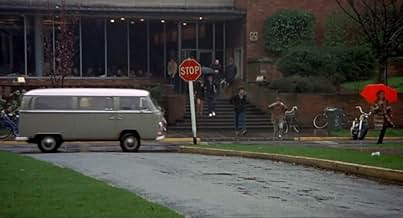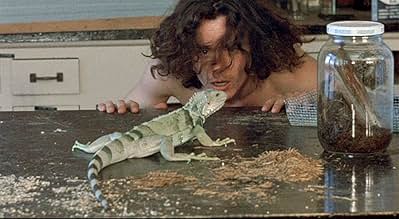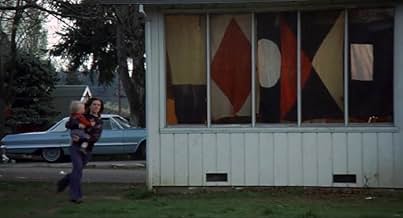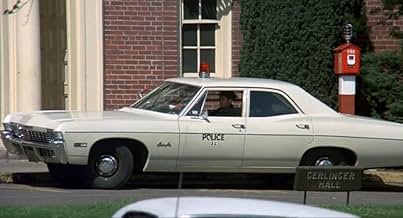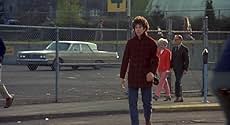IMDb RATING
5.7/10
1.8K
YOUR RATING
The star player of a college basketball team starts to go off the rails with an illicit love affair and his roommate going crazy to avoid the war draft.The star player of a college basketball team starts to go off the rails with an illicit love affair and his roommate going crazy to avoid the war draft.The star player of a college basketball team starts to go off the rails with an illicit love affair and his roommate going crazy to avoid the war draft.
- Awards
- 1 win & 1 nomination total
Michael Warren
- Easly
- (as Mike Warren)
Lynette Bernay
- Dance Instructor
- (as Lynn Bernay)
Joseph Walsh
- Announcer #1
- (as Joey Walsh)
David Ogden Stiers
- Pro Owner
- (as David Stiers)
Mireille Machu
- Secretary
- (as I.J. Jefferson)
Featured reviews
This was a very interesting movie, as it was Jack Nicholson's directorial debut, and included several other stars before they "became big" such as Bruce Dern and Karen Black. I was an extra in this movie when filmed on the University of Oregon campus/in Eugene area in 1971. Before it came out in theaters, I had left the country for the Peace Corps. When I returned, it had come and gone but I never got a chance to see it.
I remember one of the scenes was filmed with a camera inside a basket ball, and was passed back and forth across the court running from one end to the other to "get a perspective from the ball's viewpoint".
Anyone seen any copies (vhs or other options for getting a copy)? Would love to see it, as I was in several scenes but again never saw it.
Thanks for any leads or ideas of where one would go to get more info.
Bob Petow (bobpetow@comcast.net)
I remember one of the scenes was filmed with a camera inside a basket ball, and was passed back and forth across the court running from one end to the other to "get a perspective from the ball's viewpoint".
Anyone seen any copies (vhs or other options for getting a copy)? Would love to see it, as I was in several scenes but again never saw it.
Thanks for any leads or ideas of where one would go to get more info.
Bob Petow (bobpetow@comcast.net)
Hector (William Tepper) is a star basketball player for the College basketball team he plays for, the Leopards. His girlfriend, Olive (Karen Black), does not know whether to stay with him or leave him. And his friend, Gabriel (Michael Margotta), who may have dropped out from school and become a protester, wants desperately not to get drafted for Vietnam.
This film marks Jack Nicholson's directorial debut, a chair he would not return to often. The casting was nothing special (though Karen Black is always great); the best part may be Bruce Dern as the coach. Some day he will get the full respect he deserves.
Roger Ebert found the film "disorganized", but also said it was "occasionally brilliant" with the performances being "the best thing in the movie", including the "laconic charm" of Tepper. This seems fair. For all the good things that can be said, it never really hits home hard enough, and may be dated.
This film marks Jack Nicholson's directorial debut, a chair he would not return to often. The casting was nothing special (though Karen Black is always great); the best part may be Bruce Dern as the coach. Some day he will get the full respect he deserves.
Roger Ebert found the film "disorganized", but also said it was "occasionally brilliant" with the performances being "the best thing in the movie", including the "laconic charm" of Tepper. This seems fair. For all the good things that can be said, it never really hits home hard enough, and may be dated.
Drive, He Said, Jack Nicholson's first solo outing as writer/director for BBS Productions, one of the first true indie film powerhouses, is unfortunately also it's first genuine misfire and failure for good reason: the film is virtually unwatchable.
Nicholson, while unquestionably being one of the greatest actors of our time, never seemed to get much guidance (not one of BBS' strong suits) when writing scripts. He co-wrote Head with Bob Rafelson, mostly stoned, and that actually kind of worked given that film's stream of consciousness/acid-trip feel. At least there was a guiding vision (probably by Rafelson) --- a genuine point to be made. That Nicholson was allowed to botch Jeremy Larner's lauded novel (with help from Larner) is inexcusable. It might have worked better had the actors just been allowed to improv all of their lines...it certainly couldn't have been worse.
Simple elements of the story --- that the college basketball hotshot hero (William Tepper) is boning the wife of a *professor* (not just a random boyfriend) is just glossed over and left for the audience to assume. It makes no real difference, because this story line (like all the others) never goes anywhere. Characters flounder in and out of scenes, overact, underact, mumble their lines, all seemingly at random. It gives you new appreciation for the directors who can pull this type of renegade filmmaking off well (Rafelson, Altman, Cassevetes). You simply cannot stand back and let the actors do whatever they feel like, which is obviously what Nicholson did. He mistakes indie filmmaking with making a documentary film (and even that's a stretch as most docs have a better sense of story and purpose).
Yes, I know the real point is supposed to be the juxtaposition between the go-go rah-rah pointlessness of the basketball story contrasted with the over-the-top campus radical B story starring the unfortunately untalented (and maybe just undirected) Michael Margotta as a guy so intent on dodging the draft that he will incite riots, streak, attempt to assault and rape a woman in her own home, and then loose an entire room of lab animals on each other just to be declared mentally unfit. It's all as subtle as being hit on the head with a sledgehammer and just as artful and entertaining.
If you can endure Karen Black screaming her lungs out for over five minutes straight, you just might have a chance at sitting through this interminably long ninety minute snoozer. If you buy the Criterion BBS box (an awesome set, by the way), it's worth a look because it's such a freak show, otherwise don't bother.
Note that when you read a positive review of this movie though, it is usually slathered with praise about it's nostalgia and social value/accuracy as a "gritty portrait of our times" in regards to early '70s campus friction.
There's a good reason for that too: with a movie as flimsily made as Drive, He Said, you MUST bring something to the equation yourself. God knows it isn't on the film itself.
Nicholson, while unquestionably being one of the greatest actors of our time, never seemed to get much guidance (not one of BBS' strong suits) when writing scripts. He co-wrote Head with Bob Rafelson, mostly stoned, and that actually kind of worked given that film's stream of consciousness/acid-trip feel. At least there was a guiding vision (probably by Rafelson) --- a genuine point to be made. That Nicholson was allowed to botch Jeremy Larner's lauded novel (with help from Larner) is inexcusable. It might have worked better had the actors just been allowed to improv all of their lines...it certainly couldn't have been worse.
Simple elements of the story --- that the college basketball hotshot hero (William Tepper) is boning the wife of a *professor* (not just a random boyfriend) is just glossed over and left for the audience to assume. It makes no real difference, because this story line (like all the others) never goes anywhere. Characters flounder in and out of scenes, overact, underact, mumble their lines, all seemingly at random. It gives you new appreciation for the directors who can pull this type of renegade filmmaking off well (Rafelson, Altman, Cassevetes). You simply cannot stand back and let the actors do whatever they feel like, which is obviously what Nicholson did. He mistakes indie filmmaking with making a documentary film (and even that's a stretch as most docs have a better sense of story and purpose).
Yes, I know the real point is supposed to be the juxtaposition between the go-go rah-rah pointlessness of the basketball story contrasted with the over-the-top campus radical B story starring the unfortunately untalented (and maybe just undirected) Michael Margotta as a guy so intent on dodging the draft that he will incite riots, streak, attempt to assault and rape a woman in her own home, and then loose an entire room of lab animals on each other just to be declared mentally unfit. It's all as subtle as being hit on the head with a sledgehammer and just as artful and entertaining.
If you can endure Karen Black screaming her lungs out for over five minutes straight, you just might have a chance at sitting through this interminably long ninety minute snoozer. If you buy the Criterion BBS box (an awesome set, by the way), it's worth a look because it's such a freak show, otherwise don't bother.
Note that when you read a positive review of this movie though, it is usually slathered with praise about it's nostalgia and social value/accuracy as a "gritty portrait of our times" in regards to early '70s campus friction.
There's a good reason for that too: with a movie as flimsily made as Drive, He Said, you MUST bring something to the equation yourself. God knows it isn't on the film itself.
10titov
This may be the only film that actually comes close to capturing on film the essentially uncapturable world of the American college experience of the late 60s-early 70s. Go ahead, name another movie that even approaches this one: "Getting Straight"? "RPM"? These are caricatures. "Return of the Secaucus Seven" has its moments, but that's a retrospective film about (self-obsessed) individuals more than a film about a time and a place depicted *in* that time and place. "Drive, He Said" portrays-- with subtlety and nuance where it should, and a swift kick in the shorts where that's the only appropriate way-- the anti-draft movement, the ambiguity of big-time college sports (especially when there's a war on), the sexual revolution of the period, and the general unreality of the day. Believe me, it was like that.
The whole cast deserves commendation (as does the director, of course) but particular praise should be reserved for Bruce Dern, as the basketball coach, and Karen Black, the hero's very unusual-- except for that time-- love interest. William Tepper, as the lead, also rates a real round of applause both for his perfect capturing of the student-athlete of the period and for actually playing real college basketball in the film (remember Anthony Perkins in "Tall Story"? Yikes!).
All in all, a classic of a kind-- and the last film someone currently in 6th grade should be writing comments on ("boring", "repellent"-- um, right, sonny, please go back to your Arnold movies). Why isn't this film available from imdb?
The whole cast deserves commendation (as does the director, of course) but particular praise should be reserved for Bruce Dern, as the basketball coach, and Karen Black, the hero's very unusual-- except for that time-- love interest. William Tepper, as the lead, also rates a real round of applause both for his perfect capturing of the student-athlete of the period and for actually playing real college basketball in the film (remember Anthony Perkins in "Tall Story"? Yikes!).
All in all, a classic of a kind-- and the last film someone currently in 6th grade should be writing comments on ("boring", "repellent"-- um, right, sonny, please go back to your Arnold movies). Why isn't this film available from imdb?
I attended college in the late Sixties, and I wanted to chime in with Titov and others who says that this is one of only a handful of movies that captures the time as lived experience rather than journalistic cliché. I can think of only three or four others: "Baby, It's You"; "Dog Fight"; and to some extent Milos Forman's first American film, "Taking Off." Not one of these films is available on Netflix. I saw each when it came out. "Taking Off" was revived pretty often for three or four years, so there must have been others who liked it as much as I did. The others I haven't seen since they were first in theaters, so I can'be sure of my present reaction. But for 40 years I've remembered the last line of "Drive, He Said," which says something.
Did you know
- TriviaJack Nicholson's solo directorial debut. It was one of two post-Easy Rider (1969) Nicholson films that weren't released on any kind of home video until 2010. That year, the Criterion Collection released this movie and Un coin tranquille (1971) on DVD and Blu-ray as part of their "America Lost And Found - The BBS Story" box set.
- GoofsDuring the second basketball game, the writing on the Ohio Leopards jerseys frequently changes from "Leopards" to "Ohio" on a shot by shot basis.
- Crazy creditsThe opening credits are typed so small, one can hardly read them. Sometimes the letters in the names are blurred because of their ultra-small size.
- ConnectionsFeatured in Skin: A History of Nudity in the Movies (2020)
- How long is Drive, He Said?Powered by Alexa
Details
Box office
- Budget
- $800,000 (estimated)
Contribute to this page
Suggest an edit or add missing content



